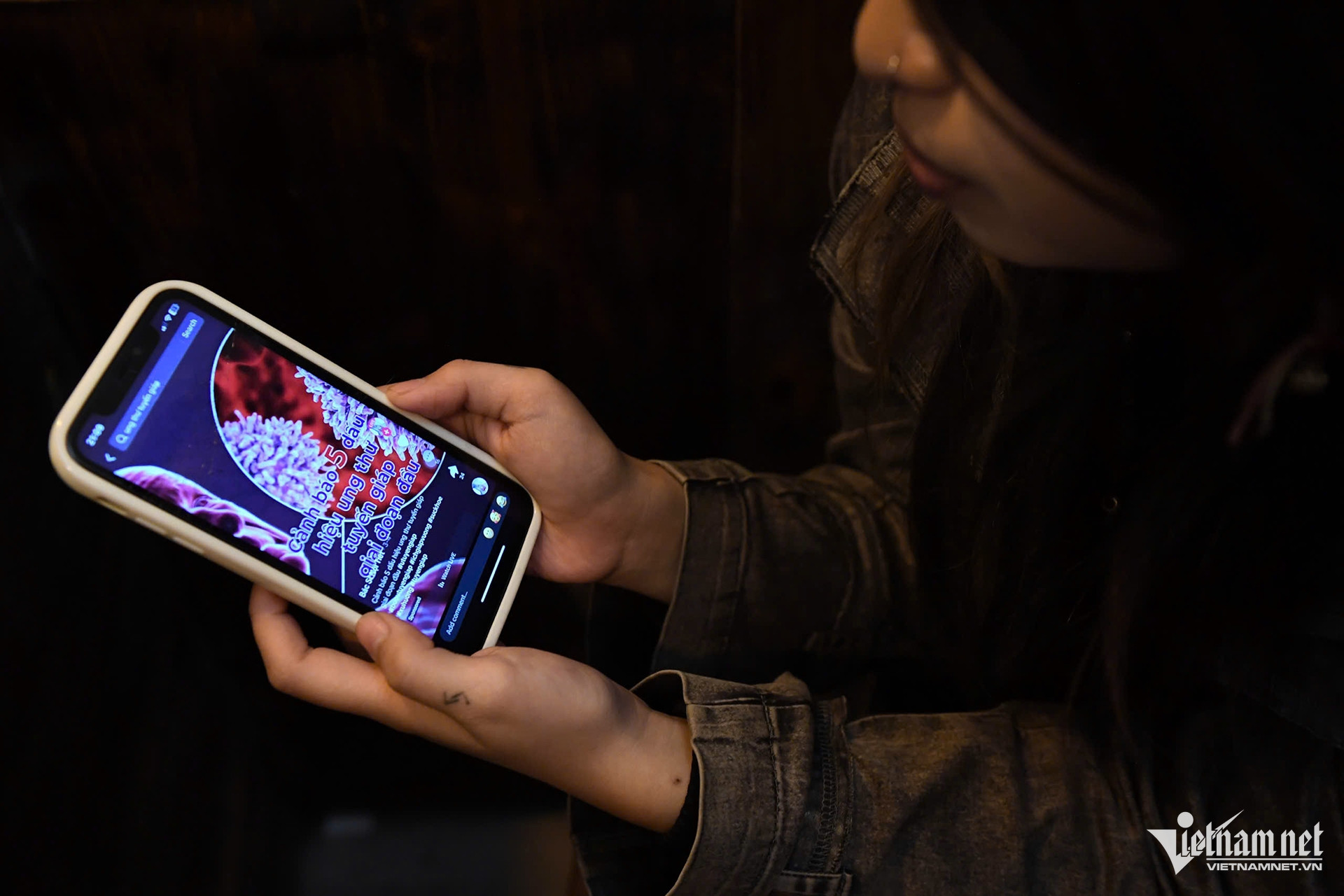
Many TikTokers, claiming to be medical experts, create personas, share knowledge, or offer advice to viewers. However, the information they provide often raises doubts, lacks scientific basis, and poses serious risks to public health.
Losing sleep over TikTok "doctors"
Before bedtime, Vu Ngoc Anh Thu, 27, from Hanoi, felt a lump behind her ear. Running her hand down her neck, she found another one, painful when pressed. In panic, Thu searched TikTok for "lumps on the neck" and was met with a barrage of videos with varying warnings about lumps, cures without medicine, or drinking lemongrass and lemon.
Overwhelmed with anxiety, she couldn’t sleep that night. Video after video delivered health warnings from people claiming to be doctors.
“That whole night, I lived in fear, thinking I was about to die, wondering how much time I had left, believing the lumps meant metastasis. I thought about how to tell my parents, even picturing my own funeral,” Thu recalled.
The next day, she went to work in a daze, tears welling up as thoughts of illness and death consumed her.
The following night, Thu continued scouring the internet for cancer-related videos. By 11 pm, unable to face the “truth” of having a terminal illness alone, she called her best friend. Her friend urged her to get checked at a hospital to confirm her health status.
The next day, she went to K Hospital (Hanoi) early in the morning. The doctor found no serious condition—just swollen, reactive lymph nodes causing the pain. Only then did the young woman breathe a sigh of relief, having endured two terrifying nights after browsing social media for health guesses.
Doan Du Manh, a member of the Vietnam Vascular Association, said TikTok has long been a popular platform among young people for information, including health warnings.
However, the sharing of knowledge on this platform raises serious concerns due to individuals posing as doctors or medical experts. In reality, many exaggerated disease warnings are followed by unscientific solutions, carrying harmful content.
Fake doctors flood the Internet
In 2023, a doctor named H.D.T from HCM City stirred up the public with a controversial diet. He stated that drinking too much milk caused cancer, that excessive fish sauce led to cancer, and radish peels caused brain shrinkage. He said eating brown rice with sesame salt, mixing soy sauce with water, drinking cassava root powder, or following a macrobiotic diet can cure cancer.
The fake doctor even claimed to have "cured about 40 pancreatic, liver, bone, breast, and throat cancer patients." These widely shared warnings sparked public anxiety, prompting legitimate doctors to debunk the baseless claims.
In November 2023, when the HCM City Department of Health conducted an inspection, “doctor” T could not provide sufficient documents proving his medical training or a practice license issued by the Department. He was fined VND104 million.
Another prominent TikTok case involved a man named T.T.T (using the alias Mr. L), with hundreds of thousands of followers. He made bold claims to lure people to his services, stating that 99 percent of aesthetic clinics in Vietnam are unlicensed and incapable of providing services.
T. couldn’t produce a practice license and admitted he had never trained at any medical institution.
Doan Du Manh of the Vietnam Vascular Association said TikTok videos are typically short and tap into people’s desire for quick fixes. The TikTokers often wear white lab coats to boost “credibility,” but little is known about their true qualifications.
Ha Hai Nam, Deputy Head of Surgery Department 1 at K Hospital, noted that fake doctors on social media are increasingly hard to identify, and their advice can lead to severe consequences, even endangering lives.
Nam said he has been shocked by advice given to patients, such as claims that breast cancer can be cured with lemon water or sugarcane juice, or that brain tumors are benign because “the brain just contains water and fat”. More seriously, some said cancer patients would die if they were treated with Western medicine.
The HCM City Department Health has repeatedly warned about individuals claiming medical expertise, setting up websites, accounts, or groups on social media platforms, and posting clips disguising their experience or medical knowledge. Through these, they advertise unlicensed medical services or impersonate others to sell supplements.
Vo Thu